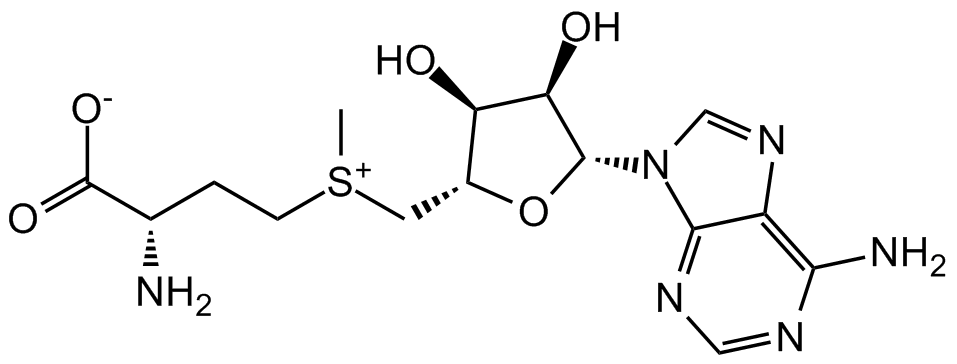S-Adenosylmethionine
| Code | Size | Price |
|---|
| CDX-A0247-M050 | 50 mg | £242.00 |
Quantity:
| CDX-A0247-M100 | 100 mg | £387.00 |
Quantity:
Prices exclude any Taxes / VAT
Overview
Regulatory Status: RUO
Shipping:
AMBIENT
Storage:
Short term: -20°C. Long term: -20°C
Images
Documents
Further Information
Alternate Names/Synonyms:
SAM; SAMe; AdoMet; Ademethionine; S-Adenosyl-L-Methionine
Appearance:
White top off-white powder.
CAS:
29908-03-0
EClass:
32160000
Form (Short):
solid
Handling Advice:
Protect from light and moisture.
InChi:
InChI=1S/C15H22N6O5S/c1-27(3-2-7(16)15(24)25)4-8-10(22)11(23)14(26-8)21-6-20-9-12(17)18-5-19-13(9)21/h5-8,10-11,14,22-23H,2-4,16H2,1H3,(H2-,17,18,19,24,25)/t7-,8+,10+,11+,14+,27?/m0/s1
InChiKey:
MEFKEPWMEQBLKI-AIRLBKTGSA-N
Long Description:
Chemical. CAS: 29908-03-0. Formula: C15H22N6O5S. MW: 398.44. S-Adenosylmethionine (SAM) is the first product of the methionine cycle and is implicated in the synthesis of polyamines and in the transsulfuration pathway leading to homocysteine and reduced glutathione (GSH) biosynthesis. SAM is synthesized from methionine and ATP in a reaction catalyzed by methionine adenosyltransferases (MATs). These enzymes are encoded by two genes, MAT1A and MAT2A. SAM plays an essential role as methyl-donor for the methylation reactions during which it is transformed to S-adenosylhomocysteine (SAH). SAH, a strong inhibitor of transmethylations, is transformed to homocysteine (HCY) by a specific hydroxylase. The methionine cycle plays a fundamental role in the cellular metabolism and the alteration of its functionality causes important disorders linked to modification of DNA methylation and gene expression, redox imbalance and metabolic reprogramming in liver and brain. More than 40 methyl transfers from SAM are known, to various substrates such as nucleic acids, proteins, lipids and secondary metabolites. In bacteria, SAM is bound by the SAM riboswitch, which regulates genes involved in methionine or cysteine biosynthesis. In eukaryotic cells, SAM serves as a regulator of a variety of processes including DNA, tRNA, and rRNA methylation; immune response; amino acid metabolism; transsulfuration; and more. In plants, SAM is crucial to the biosynthesis of ethylene, an important plant hormone and signaling molecule. SAM is a dietary supplement with potent antidepressant effects, and has the potential for liver disease and osteoarthritis research.
MDL:
MFCD00871208
Molecular Formula:
C15H22N6O5S
Molecular Weight:
398.44
Package Type:
Vial
Product Description:
S-Adenosylmethionine (SAM) is the first product of the methionine cycle and is implicated in the synthesis of polyamines and in the transsulfuration pathway leading to homocysteine and reduced glutathione (GSH) biosynthesis. SAM is synthesized from methionine and ATP in a reaction catalyzed by methionine adenosyltransferases (MATs). These enzymes are encoded by two genes, MAT1A and MAT2A. SAM plays an essential role as methyl-donor for the methylation reactions during which it is transformed to S-adenosylhomocysteine (SAH). SAH, a strong inhibitor of transmethylations, is transformed to homocysteine (HCY) by a specific hydroxylase. The methionine cycle plays a fundamental role in the cellular metabolism and the alteration of its functionality causes important disorders linked to modification of DNA methylation and gene expression, redox imbalance and metabolic reprogramming in liver and brain. More than 40 methyl transfers from SAM are known, to various substrates such as nucleic acids, proteins, lipids and secondary metabolites. In bacteria, SAM is bound by the SAM riboswitch, which regulates genes involved in methionine or cysteine biosynthesis. In eukaryotic cells, SAM serves as a regulator of a variety of processes including DNA, tRNA, and rRNA methylation; immune response; amino acid metabolism; transsulfuration; and more. In plants, SAM is crucial to the biosynthesis of ethylene, an important plant hormone and signaling molecule. SAM is a dietary supplement with potent antidepressant effects, and has the potential for liver disease and osteoarthritis research.
Product Line Areas NEW:
Biochemicals, Immunology
Product Type:
Chemical
Purity:
>95% (NMR)
SMILES:
C[S+](C[C@@H]1[C@@H](O)[C@@H](O)[C@H](N2C=NC3=C(N)N=CN=C32)O1)CC[C@H](N)C([O-])=O
Solubility Chemicals:
Soluble in water (20mg/ml) or DMSO (20mg/ml).
Transportation:
Non-hazardous
UNSPSC Category:
Biochemical Reagents
UNSPSC Number:
12352200
Use & Stability:
Stable for at least 2 years after receipt when stored at -20A°C.
References
[1] S.C. Lu, et al.; Physiol. Rev. 92, 1515 (2012) | [2] R.M. Pascale, et al.; Cells 11, 409 (2022)



